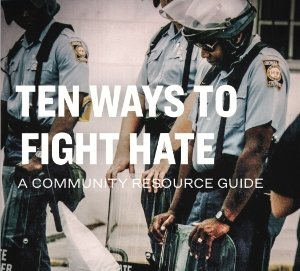 Bias is a human condition, and American history is rife with prejudice against groups and individuals because of their race, religion, disability, sexual orientation, or other characteristics. As a nation, we’ve made a lot of progress, but stereotyping and unequal treatment persist.
Bias is a human condition, and American history is rife with prejudice against groups and individuals because of their race, religion, disability, sexual orientation, or other characteristics. As a nation, we’ve made a lot of progress, but stereotyping and unequal treatment persist.
When bias motivates an unlawful act, it is considered a hate crime. Most hate crimes are inspired by race and religion, but hate today wears many faces. Bias incidents (eruptions of hate where no crime is committed) also tear communities apart and can escalate into actual crimes.
Since 2010, law enforcement agencies have reported an average of about 6,000 hate crime incidents per year to the FBI. But government studies show that the real number is far higher — an estimated 260,000 per year. Many hate crimes never get reported, in large part because the victims are reluctant to go to the police. In addition, many law enforcement agencies are not fully trained to recognize or investigate hate crimes, and many simply do not collect or report hate crime data to the FBI.
The good news is, all over the country people are fighting hate, standing up to promote tolerance and inclusion. More often than not, when hate flares up, good people rise up against it — often in greater numbers and with stronger voices.
This guide sets out 10 principles for fighting hate in your community.
DOWNLOAD Ten Ways to Fight Hate
36 pg. guide by the Southern Poverty Law Center
If you’re reading this post, you probably want to “do something” about hate. You are not alone. Questions like these arrive daily at the Southern Poverty Law Center. When a hate crime occurs or a hate group rallies, good people often feel helpless. We encourage you to act, for the following reasons:
1. Hate is an open attack on tolerance and acceptance.
It must be countered with acts of goodness. Sitting home with your virtue does no good. In the face of hate, silence is deadly. Apathy will be interpreted as acceptance — by the perpetrators, the public, and — worse — the victims. If left unchallenged, hate persists and grows.
2. Hate is an attack on a community’s health.
Hate tears society along racial, ethnic, gender, and religious lines. The U.S. Department of Justice warns that hate crimes, more than any other crime, can trigger community conflict, civil disturbances, and even riots. For all their “patriotic” rhetoric, hate groups and their imitators are really trying to divide us; their views are fundamentally anti-democratic. True patriots fight hate.
3. Hate escalates.
Take seriously the smallest hint of hate — even what appears to be simple name-calling. The Department of Justice again has a warning: Slurs often escalate to harassment, harassment to threats, and threats to physical violence. Don’t wait to fight hate.
DOWNLOAD Ten Ways to Fight Hate
